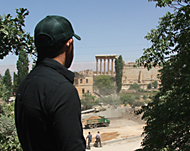Lebanon’s tourism trade in ruins
Israel’s offensive in Lebanon is having a devastating effect on the latter’s tourism industry.

After years of civil war, Lebanon has re-invented itself as one of the most popular holiday destinations in the Middle East, with Beirut having the region’s liveliest nightlife.
But 48 hours of attack by air and sea have threatened the livelihoods of the many residents reliant on tourism.
Strikes on Beirut’s Rafiq al-Hariri International Airport caused its closure on Thursday and several flights were diverted to Larnaca in Cyprus.
Lebanon only international airport was often the scene of conflict in the past, including the hijacking in 1985 of a TWA passenger jet, and the subsequent murder of a US navy diver by fighters loyal to Hezbollah.
But it has since been renovated and reinvented as a hub for tourism and commerce.
However, with further bombs hitting the airport on Friday, several airlines, including Qatar Airways and Gulf Air, have suspended flights to and from Beirut.
 |
|
Thousands of tourists have |
Gulf Air operates 12 flights a week between Bahrain and Beirut, and a spokesperson said the suspension would continue indefinitely.
Jad Tohme works at the airport and lives in the nearby village of Kfarchima. He was about to leave for work when the first bombs landed on the runway.
“My company has told me they would call me when the airport opens and I can return to work, but it’s not looking very likely,” he said. “The airport closure means that it has lost a lot of money.”
Beirut is popular with Gulf nationals seeking to escape the oppressive summer heat. They made up a large number of the thousands of visitors escaping across the border into Syria. Tohme said that up to 12,000 left on Thursday.
The violence has also harmed the city bars and cafes.
Many Lebanese live and work abroad and return in the summer to party through the night, but in the past couple of days business has come to a near standstill.
|
“My survival is under threat. What can I do? It’s out of my control” Faisal, a cafe worker |
Faisal, who works at a cafe in the trendy Gimmayza Street area, said: “Business is very slow. Today I have served four people and that was for coffee, when normally I would serve around 30 to 40 people by this time.
“If this continues I might as well shut altogether. I have a family to feed and I cannot rely on selling a few cups of coffee. My survival is under threat. What can I do? It’s out of my control.”
This year was expected to produce the highest growth in Lebanese tourism since the end of the civil war in 1990, with the government projecting a figure of 1.6 million visitors.
Worried
Figures until the end of June indicated that 600,000 people had visited, a 24% increase on the first six months of last year.
But now hotels in Beirut and beyond are fearful for the rest of the summer
Cossette works in the Edde Sands resort in the town of Byblos, a holiday destination about 20km north of Beirut, and said people were worried by the level of cancellations.
 |
|
Baalbek had been expecting |
Sarah Plummer, from the Intercontinental chain of hotels, said that their Phoenicia hotel in Beirut had also received cancellations.
Ruined
Many summer events are under threat, including a festival in the ancient town of Baalbek, and residents can see no respite from the misery.
Tohme said: “We were preparing for lots of tourists and now no one will want to come here. Lebanon is a beautiful country, where you can do anything and everything … it is ruined now.
“I’m angry and upset … this is my country and watching what is happening is breaking my heart.”